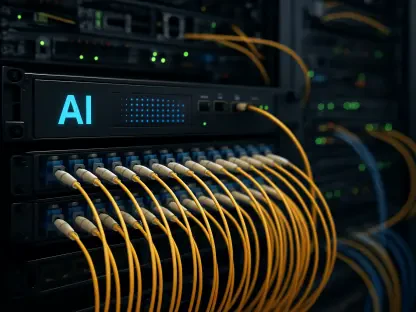The smart module market has been experiencing rapid growth, fueled by the confluence of cutting-edge technologies such as Artificial Intelligence (AI), 5G, the Internet of Things (IoT), and edge computing. These advancements have transformed smart modules from simple components into indispensable elements within the modern connected ecosystem, impacting a variety of environments ranging from urban centers to industrial complexes. In an era where digital transformation is key, the role of smart modules has never been more crucial as they propel forward the age of seamless connectivity, efficiency, and innovation.
Rise of Smart Building Solutions
Impact on Sustainability and Efficiency
The proliferation of smart building solutions has emerged as a pivotal factor in accelerating the growth of the smart module market. In this context, smart modules have become integral to the architecture of energy-efficient and intelligent infrastructures. As global trends lean heavily toward sustainability, there is a growing need for systems that optimize energy usage while enhancing the livability and security of environments. With the increased implementation of smart modules in heating, ventilation, and air conditioning (HVAC) units, lighting systems, and security networks, buildings are now more than ever optimized for performance. This technological pivot is not only ecological but also economically advantageous, supporting the growing narrative around sustainable urban development.
Smart modules are uniquely positioned to support the ambitious sustainability goals set by various governments and organizations worldwide. The role of these modules extends beyond merely integrating with existing infrastructure; they are designed to adapt to real-time data, allowing for sophisticated energy management systems that significantly reduce wastage. For instance, intelligent lighting systems can lower electricity consumption by adjusting based on occupancy, daylight, and other environmental factors. Moreover, IoT-enabled security systems improve surveillance capabilities and offer enhanced safety by leveraging advanced sensors and AI algorithms to detect and respond to threats promptly. As urbanization continues to increase, these modules serve as the backbone for sustainable infrastructure, paving the way for smarter cities.
Growth in Consumer Electronics
The expansive growth within consumer electronics is proving to be a significant driver of demand for smart modules. As connected devices proliferate within households, including wearables and smart home applications, there is an ever-increasing need for versatile, compact modules. The Asia-Pacific (APAC) and North American regions remain at the forefront of this technological wave, leveraging a booming consumer market keen on adopting the latest innovations. Smart modules play a crucial role in enabling these devices to deliver seamless functionalities that improve convenience, safety, and overall quality of life.
The continued integration of smart modules into consumer electronics aligns with the global shift toward hassle-free smart living. These modules enhance product capabilities by providing critical connectivity, processing, and sensing functions. By integrating with wireless technologies such as 5G and Wi-Fi 6, smart modules facilitate rapid data transmission and connectivity, crucial for the real-time operations demanded by today’s always-on culture. Within the consumer space, demand is driven by tech-savvy individuals looking to optimize everyday tasks through device interconnectivity, as well as by industries reimagining their offerings to meet modern consumer expectations.
Edge Computing and Data Processing Innovations
Shift to Real-Time Data Management
Edge computing has become a foundational pillar upholding the smart module market’s expansive growth. By localizing data processing closer to the data sources, edge devices minimize latency and enhance the speed at which information is processed and decisions are made. Smart modules embedded in edge computing devices capitalize on increased efficiency and reduced lag time, optimizing operations in various sectors. This shift is particularly transformative for industries that require real-time data management to drive critical processes, including healthcare, automotive, and manufacturing.
For businesses, the integration of edge computing with smart modules has redefined how they approach data management and decision-making. In sectors where quickly responding to changing data inputs can mean the difference between success and failure, smart modules are proving invaluable. They facilitate rapid collection, analysis, and application of data insights, resulting in more agile and responsive operations. This evolution significantly impacts how companies implement strategies, paving the way for digital transformation and smarter business practices. Furthermore, the application of AI and machine learning algorithms has expanded the capability of smart modules, enabling predictive analysis that supports proactive, rather than reactive, management.
AI and Machine Learning Integration
The integration of Artificial Intelligence (AI) and Machine Learning (ML) algorithms in smart modules is revolutionizing how industries operate and manage data. These algorithms process vast quantities of data to draw meaningful insights that inform critical business decisions. This real-time analysis facilitates automation and increases efficiency across sectors, allowing for faster decision-making and greater operational effectiveness. By transforming raw data into actionable intelligence swiftly, smart modules equipped with AI and ML implement transformative changes across the automotive, healthcare, and industrial automation industries.
One of the most promising aspects of AI and ML integration within smart modules is the ability to support advanced applications, such as predictive maintenance and autonomous systems. Predictive maintenance leverages historical and real-time data to anticipate equipment failures, thereby significantly reducing downtime and operational costs. With autonomous vehicles and machinery, smart modules imbued with AI facilitate self-driving capabilities and improved human-machine interaction, adding a layer of safety and efficiency. Collectively, these innovations are enhancing the utility and adaptability of smart modules, positioning them as crucial enablers of dynamic technological ecosystems.
Regional Market Developments
North America and Europe Lead the Charge
North America has consistently led the charge in adopting smart home and industrial IoT solutions, significantly influencing the region’s leadership in the smart module market. Early adoption is fueled by technological advancement, robust infrastructure, and strategic investments from both government and private sectors. From smart home devices enhancing daily life to industrial IoT applications optimizing production processes, the region’s affinity for embracing cutting-edge solutions continues to drive market growth. Similarly, Europe has cemented its position as a growth leader by investing heavily in sustainability and smart infrastructure initiatives.
Europe’s strategic commitment to sustainability is evident through investments in smart cities and green energy projects, positioning the region favorably in the growing smart module market. European industries are actively integrating smart modules into infrastructure systems, catalyzing improved energy efficiency and reduced environmental impact, highlighting their core strategic pillars. As both North America and Europe advance their digital transformation efforts, opportunities for smart modules are expanding, particularly in various applications that prioritize efficiency and connectivity. Their proactive government policies coupled with a strong technological ethos make them key players in the trajectory of smart module market evolution.
Asia-Pacific as a Rising Star
In recent years, the Asia-Pacific region has emerged as a formidable force within the smart module market, primarily due to aggressive investment in 5G deployment, smart city initiatives, and the robust consumer electronics manufacturing industry. As the demand for smart and connected solutions escalates, this region is demonstrating unprecedented growth rates, driven by technological innovation and a burgeoning middle class eager for modern conveniences. The advancement of smart cities plays a pivotal role, with governments and organizations heavily investing in infrastructure aiming to improve urban living through technology integration.
The regional push for intelligent solutions is not limited to urban development alone but spans industries, fostering an environment ripe for innovation and technological advancements. Multinational and local companies, recognizing the growth potential, are increasingly allocating resources to research and development to pioneer next-generation solutions. The synergy between public policy and industry aspirations has cultivated a fertile landscape for the adoption and advancement of smart modules, positioning Asia-Pacific as an incubator for cutting-edge technology applications and a bellwether for future industry trends.
Challenges and Future Prospects
The smart module market has been witnessing a surge in growth, driven by the convergence of advanced technologies like Artificial Intelligence (AI), 5G, the Internet of Things (IoT), and edge computing. These technological breakthroughs have revolutionized smart modules, evolving them from mere components to essential pillars within today’s interconnected digital ecosystem. They play a pivotal role across diverse environments, from bustling urban centers to expansive industrial sites. In today’s world, where digital transformation serves as a pivotal driver of progress, the significance of smart modules cannot be overstated. They are ushering in a new era characterized by seamless connectivity, heightened efficiency, and continuous innovation. This evolution highlights the necessity for industries and sectors to integrate smart modules into their frameworks, ensuring they remain competitive and adaptive. As technology continues to advance, the dependency on these smart modules will grow, underscoring their value in the global push towards a more connected and efficient future.









